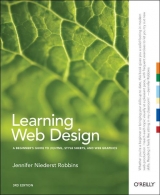
Learning Web Design
O'Reilly Media (Verlag)
978-0-596-00484-2 (ISBN)
- Titel erscheint in neuer Auflage
- Artikel merken
Here, author Jennifer Niederst shares the knowledge she's gained from years of web design experience, both as a designer and a teacher. This book starts from the beginning - defining the Internet, the Web, browsers, and URLs - so you don't need to have any previous knowledge about how the Web works. After reading this book, you'll have a solid foundation in HTML, graphics, and design principles that you can immediately put to use in creating effective Web pages. In this second edition, Jennifer has updated the book to cover style sheets and reflect current Web standards. She has also added exercises that help you to learn various techniques and short quizzes that make sure you're up to speed with key concepts. The companion CD-ROM contains material for all the exercises in the book, as well as trial versions of Fireworks MX, and HomeSite 5; Adobe Photoshop 7, ImageReady 7, and BBEdit 7. The book: covers the nuts and bolts of basic HTML and style sheets, with detailed examples of formatting text, adding graphic elements, making links, creating tables and frames, and using colour on the Web.
Explains whether to use GIFs or JPEGs for different types of images, and includes important tips on optimizing graphics for Web delivery.It provides dozens of Web design do and don'ts, to help you make good Web design decisions and avoid common beginner traps and contains hands-on exercises throughout the book that allow you to try out new techniques along the way. "Learning Web Design" should gives you everything you need to create basic Web sites and will prepare you for more advanced Web work. If you are interested in Web design, this book is the place to start. After finishing it, you'll be ready for the author's bestselling companion reference, "Web Design in a Nutshell".
Jennifer Niederst is creative director of Songline Studios, publishers of innovative online products. She began designing documents for the World Wide Web in mid-1993 as the original designer of the identity, interface, and graphics for Global Network Navigator (GNN), published by O'Reilly & Associates, Inc. Prior to her life online, Jennifer worked as a book designer for O'Reilly & Associates, Inc., and Little, Brown & Company. She has also worked as a freelance graphic designer. She attended the University of Notre Dame where she received a BFA in design and photography and a BA in art history.
Preface Part I. Getting Started 1. Where Do I Start? Am I Too Late? Where Do I Start? What Do I Need to Learn? Do I Need to Learn Java? What Do I Need to Buy? The Moral of the Story Test Yourself 2. How the Web Works The Internet Versus the Web Serving Up Your Information Web Page Addresses (URLs) The Anatomy of a Web Page Browsers Putting It All Together Test Yourself 3. Getting Your Pages on the Web Putting Files Online (FTP) Finding Server Space www ."YOU".com! Test Yourself 4. Why Web Design Isn't Like Print Design Designing for the Unknown Surviving the Unknown Keep the Lowest Common Denominator in Mind Know Your Audience Test Yourself Contents vi Contents 5. The Web Design Process Conceptualize and Research Create and Organize Content Develop the "Look and Feel" Produce Graphics and HTML Documents Create a Working Prototype Test, Test, Test! Upload and Test Again Maintain Test Yourself Part II. Learning HTML 6. Creating a Simple Page (HTML Overview) Introducing...the HTML Tag Assembling a Web Page When Good Pages Go Bad Test Yourself HTML Review: Structural Tags 7. Formatting Text with HTML "Typesetting" on the Web Building Blocks Lists Inline Styles The Tag Aligning Text Some Special Characters Test Yourself HTML Review: Text ormatting Tags 8. Formatting Text with Style Sheets Some Good Points, Some Bad Points How Style Sheets Work Creating a Simple Style Sheet Special Selectors More Text Properties External Style Sheets Test Yourself HTML Review: Style Sheet-Related Tags Style Property Review 9. Adding Graphic Elements Background Tiles Horizontal Rules Test Yourself HTML Review: Graphic Element Tags vii Contents 10. Adding Links The Anchor Tag Dissected Linking to Pages on the Web Linking Within Your Own Site Linking Within a Page Several Links in One Graphic (Imagemaps) Mail Links Test Yourself HTML Review: Link Tags 11. Tables How Tables Are Used Basic Table Structure Designing Tables HTML for Tables Using Tables for Alignment Where Tables Go Wrong Test Yourself HTML Review: Table Tags 12. Frames How Frames Work Setting Up a Frameset Document Frame Appearance and Function Targeting Frames Content for Users Without Frames Test Yourself HTML Review: Frame Tags 13. Color on the Web Specifying Colors by Name Specifying Colors by Number Elements You Can Color with HTML Coloring Elements with Style Sheets The Web Palette Test Yourself Part III. Creating Web Graphics 14. All About Web Graphics File Formats Image Resolution File Size Matters Tools of the Trade Image Sources Graphics Production Tips Web Graphics Highlights Test Yourself viii Contents 15. Creating GIFs All About GIFs Creating a Simple GIF, Step by Step Adding Transparency Optimizing GIFs Designing with the Web Palette Some Things to Remember About GIFs Test Yourself 16. Creating JPEGs More About JPEGs Making JPEGs, Step by Step Optimizing JPEGs Some Things to Remember About JPEGs Test Yourself 17. Animated GIFs How They Work GIF Animation Tools Animation Settings Creating an Anima
| Erscheint lt. Verlag | 29.7.2003 |
|---|---|
| Zusatzinfo | glossary, index |
| Verlagsort | Sebastopol |
| Sprache | englisch |
| Maße | 206 x 248 mm |
| Gewicht | 1146 g |
| Einbandart | kartoniert |
| Themenwelt | Mathematik / Informatik ► Informatik ► Web / Internet |
| ISBN-10 | 0-596-00484-2 / 0596004842 |
| ISBN-13 | 978-0-596-00484-2 / 9780596004842 |
| Zustand | Neuware |
| Haben Sie eine Frage zum Produkt? |
aus dem Bereich



